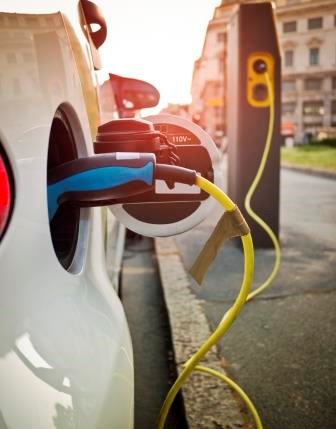
Monday Musing: To (be) open or not to (be) open? OPEN data, EV Networks and Infrastructure
BPA intern Asli Ates continues to provide her insight into the UK's Transport sector
Open data and data sharing are increasingly debated concepts in the mobility sector, as more companies make use of digital technologies, services, and platforms, they are faced with managing an ever-increasing amount of data. While some companies can benefit from the data collected from their users, ad hoc, fragmented, and limited access data does not benefit the whole sector. As restricted access to data can become a powerful, yet invisible barrier to achieving societal and political goals, such as the deployment of Electric Vehicles (EV).
But what is open data? A commonly used definition is “data that can be freely used, re-used and redistributed by anyone - subject only, at most, to the requirement to attribute and share-alike”[1]. Opening data can have many benefits; for example, increased transparency in the public sector, improved R&D and potentially reduced costs of entry and therefore greater competition.
Turning to the UK’s EV charging network, currently there are around 247,078 Ultra Low-Emission Vehicles[2], as of 21st of January 2020 in the UK[3] there were 29,886 public EV charging points with more than 35 commercial EV charging network operators. Online discussions on platforms like YouTube highlight three main issues discussed by EV users: range anxiety, charging speed and the lack of interoperability between EV network charging operators and their different registration requirements. All of these were acknowledged by the UK’s Government Energy Transport Task Force[4]. In response to the last point, the UK government has announced[5] that all rapid chargers, as well as rapid charging operators, should be part of a roaming network, built collaborative between the government and industry. While I believe that is a relatively progressive action, I think that this only offers short-term and limited benefits not only for EV users but also for society, as this is not a e-mobility specific problem but a policy gap in data governance.
So far, most of the effort in data governance goes into ensuring basic protection of personal data, which enables data collection, storage and use by private and public sectors under GDPR. However, it does not define, regulate, or enforce an individual’s rights and ownership over their data and how they can access, control, or donate their data to any public or private entities. In the EV charging sector, as in many others, operators keep their data for themselves, while users must register with multiple EV operators. This data segregation hinders interoperability within the sector and collaboration with adjacent sectors, such as energy. Furthermore, it creates a hostile environment for further R&D from individuals and small and medium enterprises and limits opportunities for social innovations, which might not be profit-driven.
As an example, as part of the BPA’s Connected Values project I have been trying to analyse opportunities for the integration of energy and transport by spatially mapping the two sectors’ infrastructure, to understand the distribution of infrastructure, capacity and any bottlenecks. However, location data for the energy and EV charging network is limited, making analysis challenging. I had to approach multiple public and private organisations asking for different bits of data. A sticking point in all these discussions was whether the data could be shared for the purposes required. It made me ask:
“Who has the right to non-personal data?”
“If data collected from citizens is going to benefit the society at large, but not only one entity, should it be stored and kept confidential and restricted?”, and the closer to home question: “How many EV network providers registrations would I need if I wanted to drive from the UK to Turkey?”
I think individuals should be the ones who should decide on and control their data, and if they want to, they should be able to open their data to the public for other companies and research institutions which could be supported with already available protection technologies. Such an open data arrangements would enable interoperability in and between sectors based on the needs and the consent of individuals. For example, it could enable an individual to use any EV charging points as well as getting one tariff bill through their home energy supplier in the UK or outside of the UK. Additionally, open data would also enable researchers and innovators to make strategic decisions on spending globally limited resources, such as money, skills, natural resources and clean air.
To illustrate the potential benefits, I would like to introduce three projects:
The Open Infrastructure Map[6], which shows the global infrastructure through the OpenStreetMap data collected through open data sources and entered manually by volunteers. The Share&Charge open EV network[7], a German-based foundation which aims to establish an open-source EV network bringing together companies, developers, and everyone else to share and use EV charging data and enable innovations for e-mobility.
DECODE project[8], funded by the EU, involves pilots in Amsterdam and Barcelona, putting “individuals in control of whether they keep their personal information private or share it for the public good.”
Source: Open Infrastructure Map
I would like to conclude this blog with a quote from David Bollier, a policy strategist, although he is referring to open-source-software, I believe it also applies to the role of open data for a ‘smarter’, ‘decarbonized’ and ‘connected’ e-mobility sector:
“Free software may have started as mere software, but it has become an existence proof that individual and collective goals, and the marketplace and the commons, are not such distinct arenas”
If this has caught your attention and you want to talk about data sharing or EV’s more generally please get in contact at consulations@britishparking.co.uk
[1] https://opendatahandbook.org/guide/en/what-is-open-data/
[2] https://www.gov.uk/government/statistical-data-sets/all-vehicles-veh01#ultra-low-emissions-vehicles
[3] https://www.zap-map.com/statistics/
[4] https://www.lowcvp.org.uk/assets/reports/EV_Energy_Taskforce_Report_Jan2020.pdf
[5] https://www.gov.uk/government/news/all-new-rapid-chargepoints-should-offer-card-payment-by-2020

